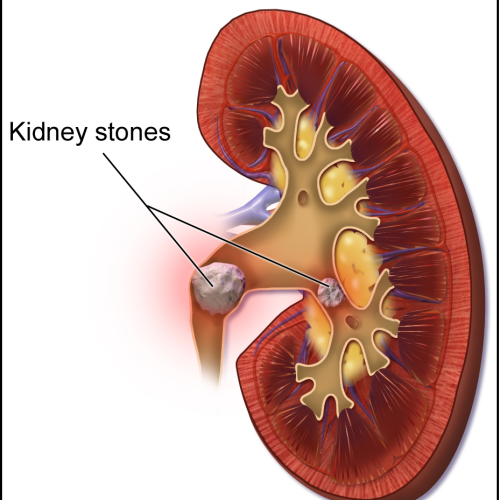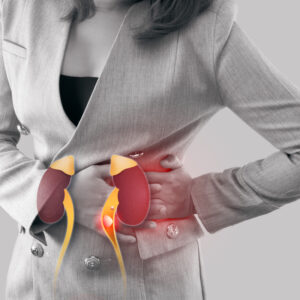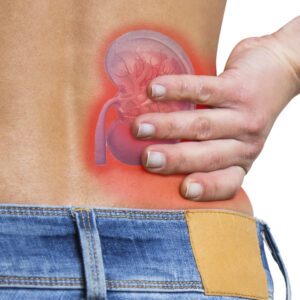Keyhole and Laser Treatment of
Kidney Stones
Kidney Stone Treatment in Chennai
Best Kidney Stone Treatment in Chennai
Keyhole and Laser Treatment of Kidney Stones
Are you searching for the best urologist doctors in Chennai? Look no further than Dr. Kabilan’s Complete Urology. We understand the severity of kidney stones, which are a prevalent issue in our clinic. Kidney stones not only cause excruciating pain by obstructing the ureter but can also silently grow within the kidney, posing a risk of renal failure if left untreated.
Kidney stones, primarily composed of calcium oxalate salt crystals, form when the concentration of these salts in the urine surpasses its solubility. Crystals aggregate over time to form stones. However, our bodies produce both promoters and inhibitors of stone formation, and our diet also plays a significant role in maintaining the balance.
Stones can develop anywhere in the urinary tract, from the renal papilla to the urethral meatus. Think of the kidneys as multitasking organs; when they face conflicting tasks like preserving water while filtering out substances, it can lead to the formation of kidney stones.
At Dr. Kabilan’s Complete Urology, our expert urology specialists in Chennai are equipped to handle all aspects of kidney stone treatment. Whether it’s utilising keyhole and laser treatment techniques or offering comprehensive care plans, we ensure that kidney stones are addressed effectively.
Our team comprises the top 10 urologists in Chennai, dedicated to providing personalised care tailored to each patient’s needs. When you choose us, you’re opting for the best urologist in Chennai, supported by the best urology hospital in the city.
Don’t let kidney stones disrupt your life. Visit Dr. Kabilan’s Complete Urology for expert diagnosis, treatment, and compassionate care in Chennai.

Other Treatments
- Keyhole And Laser Treatment Of Kidney Stones
- Laser Treatment For Prostate
- Laparoscopic Treatment Of Urological Problem
- Kidney Transplantation
- Management Of Block In Urine Flow
- Management Of Blood In Urine
- Tumours In Kidneys
- Urinary Bladder
- Penis And Prostate
- Urinary Leak And Fistula Surgery
- Male Infertility And Male Sexual Problems
- Testicular Conditions
Kidney Stones Causes
- Dehydration
- Consumption of lesser quantity of water than recommended
- Tumours and urinary tract infections
- Other medical conditions like Hyperparathyroidism or Hyperuricosuria
- High oxalate diet or low calcium diet
- Obesity
- A diet with high levels of protein, salt, or glucose
- Gastric bypass surgery
- Inflammatory bowel diseases
- High dose of Vitamin c supplementation
- Hereditary
Do You Have A Kidney Stone Risk?
Are you at risk for kidney stones? Kidney stone disease can affect anyone, especially due to the prevalence of unhealthy lifestyle choices. However, certain individuals are at greater risk than others. Factors contributing to the risk of kidney stones include obesity, family history of renal stones, and certain medications.
Looking for expert advice and treatment? Dr. Kabilan’s Complete Urology in Chennai offers the expertise of the best urologist doctors in Chennai. Our urology specialists are among the top 10 urologists in Chennai, providing unparalleled care and treatment for kidney stone disease. If you’re in need of the best urologist in Chennai or a urology specialist in Chennai, look no further than Dr. Kabilan’s Complete Urology.
Our facility is renowned as the best urology hospital in Chennai, offering advanced treatment options and personalised care. When it comes to top urology hospitals in Chennai, Dr. Kabilan’s Complete Urology stands out for its commitment to excellence in patient care and treatment outcomes. Don’t let kidney stone disease hold you back – contact us today for expert urology care in Chennai.
Symptoms Of Kidney Stones
If you’re experiencing kidney stones, it’s crucial to be aware of the symptoms. Sometimes, these stones can develop without noticeable signs, but seeking immediate attention is vital if you encounter any of the following:
- Pain in the Groyne: If you start experiencing pain in your groyne area, it could be a sign of kidney stones.
- Blood in Urine: Red, pink, or brown urine can indicate the presence of kidney stones.
- Nausea and Vomiting: Persistent nausea and vomiting might be symptoms of kidney stones.
- Change in Urine Colour or Odour: If you notice a change in the colour or smell of your urine, it could be a sign of kidney stones.
- Chills and Fever: Kidney stones can cause chills and fever, indicating an infection or other complications.
- Frequent Urination or Passing Small Amounts of Urine: An increased need to urinate frequently or passing only small amounts of urine might signal the presence of kidney stones.
If you experience any of these symptoms, it’s important to consult with Dr. Kabilan, one of the top urology specialists in Chennai. Dr. Kabilan is renowned for his expertise in urological conditions and operates at the best urology hospital in Chennai, providing comprehensive care for patients with kidney stones and other urological issues. Don’t hesitate to reach out to Dr. Kabilan for expert guidance and treatment tailored to your needs.



Kidney Stone Treatment
As one of the top 10 urologists in Chennai, Dr. Kabilan, a renowned urology specialist, offers a comprehensive array of treatment options for kidney stones to address underlying issues and correct altered mechanisms effectively. At Dr. Kabilan’s Complete Urology, we pride ourselves on providing exceptional care and treatment for various urological conditions, including kidney stones.
For those seeking the best urologist in Chennai, look no further than Dr. Kabilan. With expertise and advanced techniques, Dr. Kabilan ensures that patients receive the highest quality care for kidney stone treatment in Chennai.
At our state-of-the-art urology hospital in Chennai, we offer a range of cutting-edge treatments, including keyhole surgery and laser surgery, to effectively remove kidney stones. Dr. Kabilan utilises the latest equipment and techniques to perform these procedures with precision and success.
For small stones, medical management is a feasible option, while larger and more complex stones may require surgical intervention. Dr. Kabilan employs advanced surgical techniques such as Retrograde Intrarenal Surgery (RIRS) and Per-Cutaneous Nephro Lithotomy (PCNL) to address these cases. RIRS involves the use of a flexible scope and LASER probe to break down the stone, while PCNL involves making a small incision over the kidney region to access and remove the stone.
At Dr. Kabilan’s Complete Urology, our primary goal is to ensure complete clearance of stones in the kidney to prevent recurrence. Dr. Kabilan’s expertise and dedication to urological care make us the best urology hospital in Chennai for kidney stone treatment.
Experience the difference with Dr. Kabilan’s Complete Urology and regain optimal urological health with the leading urology specialist in Chennai.
Keyhole And Kidney Stones
Discover the pinnacle of urological care with Dr. Kabilan’s Complete Urology, where we redefine excellence in treating kidney stones through cutting-edge procedures. Renowned as the best urology hospital in Chennai, our team comprises expert urology specialists who rank among the top 10 urologists in the city. With a focus on minimally invasive techniques, including keyhole surgery, we ensure optimal outcomes for our patients.
At Dr. Kabilan’s Complete Urology, we understand the significance of precision and innovation in urological interventions. Our best urologists in Chennai utilise state-of-the-art tools and techniques to perform laparoscopic surgery for kidney stones, setting a new standard in urological care. By employing small incisions and advanced instrumentation, we effectively remove or break up kidney stones with unparalleled precision and minimal disruption to the body.
Choosing Dr. Kabilan’s Complete Urology means entrusting your urological health to the most experienced urology specialists in Chennai. Our urologists specialise in delivering personalised care tailored to each patient’s unique needs, ensuring comprehensive treatment and rapid recovery. Experience the difference of superior urological care at the top urology hospital in Chennai—Dr. Kabilan’s Complete Urology.
Benefits Of Keyhole Surgery For Kidney Stones
Minimally invasive
Discover the Best Urologist Doctors in Chennai at Dr. Kabilan's Complete Urology. Our team comprises Expert Urology Specialists in Chennai, recognized among the Top 10 Urologists in the city. As the leading Urology Hospital in Chennai, we offer advanced techniques such as Keyhole Surgery, ensuring minimally invasive procedures. Our Best Urologists in Chennai specialise in minimally invasive techniques, providing less intrusive surgeries with smaller incisions, minimal discomfort, and quicker recovery times. Trust the expertise of our Urologist Specialists in Chennai for your urological needs.
Reduced hospital stay
Discover the Advantage of Keyhole Surgery for Kidney Stones at Dr. Kabilan's Complete Urology, the Best Urology Hospital in Chennai. Our expert team, led by the top 10 urologists in Chennai, offers keyhole surgery, allowing patients to resume regular activities sooner. As the leading urologist specialist in Chennai, we prioritise outpatient procedures and brief hospital stays, ensuring you get back to your routine quickly. Trust the expertise of Dr. Kabilan's Complete Urology for the best care and reduced hospital stay.
Lower risk of problems
With keyhole surgery, you experience a lower risk of complications such as infection, haemorrhage, and other surgical consequences compared to traditional open surgery. Trust the best urologist in Chennai and our specialised team at Dr. Kabilan's Complete Urology, the leading urology hospital in Chennai, for optimal results and a smoother recovery.
Superior cosmetic results
Experience superior cosmetic results with Dr. Kabilan's Complete Urology in Chennai. Our expert urology specialists are among the top 10 urologists in Chennai, offering the best cosmetic outcomes through keyhole surgery techniques. Patients benefit from tiny incisions and minimal scarring, making us the best urology hospital in Chennai for achieving optimal cosmetic results.
Precision in visualisation
Experience the precision of Dr. Kabilan's Complete Urology, where our expert urology specialists in Chennai utilise state-of-the-art laparoscopic technology to provide unparalleled care. As one of the top 10 urologists in Chennai, our team ensures the best urological outcomes with high-definition, enlarged visuals, allowing for precise identification of kidneys and stones. Trust the best urology hospital in Chennai for comprehensive and advanced urological care.
It’s crucial to understand that not all kidney stones can be removed through a keyhole. The size, quantity, and placement of the stones, as well as the patient’s general health, all play a role in the choice to conduct this treatment. To choose the best kidney stone treatment strategy, it is essential to speak with a urologist surgeon.
Laser Treatment of Kidney Stones
Are you suffering from kidney stones? Look no further than Dr. Kabilan’s Complete Urology, home to the best urologist doctors in Chennai. Our team of expert urology specialists in Chennai is dedicated to providing top-notch care, utilising the latest techniques in kidney stone laser lithotripsy.
At Dr. Kabilan’s Complete Urology, we take pride in being recognized as one of the top urology hospitals in Chennai. Led by the best urologist in Chennai, our facility is equipped with cutting-edge technology, including a lithotripter, specialised medical equipment used in kidney stone laser therapy.
Kidney stone laser lithotripsy, also known as extracorporeal shock wave lithotripsy (ESWL), is a non-invasive procedure that effectively dissolves and removes kidney stones. Our urologist specialists in Chennai utilise this advanced technique to target kidney stones with concentrated shock waves or laser pulses, breaking them into smaller, more manageable pieces.
Dr. Kabilan’s Complete Urology ensures that the treatment for kidney stones is performed with the utmost care and adherence to protocols. Our top urologists in Chennai have achieved a high success rate in kidney stone laser lithotripsy, making the process safe and efficient.
One of the key advantages of kidney stone laser lithotripsy is its non-invasiveness, which leads to a speedy recovery. The concentrated energy delivered by the lithotripter breaks down kidney stones into tiny fragments, facilitating easier passage through the urinary tract. In some cases, the stones are completely disintegrated into minute particles that can be passed out spontaneously through urine.
Choosing Dr. Kabilan’s Complete Urology for kidney stone laser treatment ensures you receive expert care from the best urologist doctors in Chennai. Our commitment to excellence, combined with the expertise of our urology specialists in Chennai, makes us the top choice for urological care in the region.
If you’re looking for the best urology hospital in Chennai for kidney stone treatment, trust Dr. Kabilan’s Complete Urology to provide personalised care and effective solutions tailored to your needs. Book your appointment today and take the first step towards a stone-free life with our top urologists in Chennai.
How To Prevent Kidney Stones?
- Stay adequately hydrated at all times of the year.
- Diet of kidney stones: reduce the consumption of salt and fat.
- Start eating calcium-rich foods, but at the same time avoid taking large doses of calcium supplements to compensate for your unhealthy eating habits.
- Reduce high oxalate foods such as peanuts, coffee, chocolate etc. and animal protein foods.

